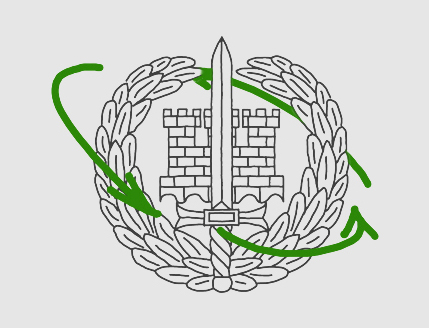A Common, Universities’ Workshop on Sustainable Development at the National Defence University
Representatives from all Finnish universities gathered in Santahamina in early September for a workshop on sustainability and responsibility. The event was organised by the sustainable development working group of Universities Finland (UNIFI). You can check out the hashtag #kekebootcamp to get into the mood of the exercise.

The Purpose of the Work Shop is to Get People to Work Together for Sustainability and Responsibility
The basis of the sustainable development workshop is the UN’s sustainable development programme Agenda 2030, which contains 17 extensive and ambitious sustainable development goals. The goals include achieving gender equality, peace and fairness, slowing climate change and responsible education.
The Friday workshop included students, researchers, government representatives and leaders from different universities. The goal of the day was to increase the participants’ understanding of work relating to responsibility and sustainable development done in other universities. Based on the results of the workshop UNIFI’s sustainable development working group will create a sustainability and responsibility action plan and concrete steps will be taken during 2020.
National Defence University as Part of the Defence Administration Branch
The Sustainable Development Commission is a central actor monitoring and evaluating the execution of Agenda 2030. It is led by the Prime Minister of Finland. As part of the Defence Forces the National Defence University (NDU) is a part of the defence administration branch under the Ministry of Defence. The goal of the branch is to carry out the tasks of the branch in a militarily, economically and ecologically sustainable way. The Ministry of Defence’s 2015 sustainable development commitment "Responsible Security" sets concrete goals for the administrative branch. The goals relate to motivating military service, sustainable materiel handling, healthy and safe in-service environment, environmentally responsible activities, and energy-efficient and climate-responsible defence. The defence administration monitors, evaluates and reports on the implementation of the programme regularly.
Commander Kari Aapro, who is responsible for organising the workshop in the National Defence University, says that every Finnish university has selected a Agenda 2030 sustainable development goal that is best connected to that university's own speciality and interests. For example, the University of Lapland is researching combining tourism and nature in Lapland from the perspective of sustainable development, and Lappeenranta University of Technology is focusing on creating new energy solutions.
Aapro points out that the NDU looks at sustainable development and responsibility particularly from the point of view of society security and stability. The goal includes, e.g creating a sustainable development objective programme for the NDU. A draft has already been made. From the perspective of teaching the National Defence University’s minimum goal is to include the defence administration sustainable development programme and goals in the teaching.
Thinking of a Green Campus and Innovation Workshops
Sustainable development activities in the NDU can be divided into six interdependent parts:
Innovation workshops – The desire to anticipate the future
Research – The ability for in-depth understanding and creating new information
Teaching – Educating skilled people who follow the times
Attitude – The ability to include sustainable development and responsibility in one’s own actions
Public affairs and community relations – Responsible and active information producer
NDU Green Campus – A sustainable and responsible actor
Aapro says that just like other universities, the NDU should specialise and focus on its own interest areas as a part of sustainable development. Relating to that it is natural that with its own research and innovations the NDU strives to find new content and solutions for a more secure and stable society, and to develop preventive actions and actions that promote security.
Research and innovations create content and structure for teaching and its implementation which in turn creates prerequisites for knowledge. A key part of knowledge is attitude education that helps the students and staff of the National Defence University to understand the meaning of sustainable development and responsibility so that they know how to act according to those principles in their own life and when making choices. For their part, knowledge and skills create the prerequisites for public affairs and community relations.
As an example of environmentally responsible actions Aapro highlights the Green Campus thinking that is already applied in many universities. We can take advantage of, or apply, existing environment systems (e.g. ISO 14001 or WWF Green Office) in creating an operating environment in line with sustainable development. WWF Green Office shows a work place how to do things in an environmentally responsible way. It enables the NDU to reduce its carbon footprint, use natural resources wisely and to protect biodiversity. Responsibility is an important action in society and a great competitive asset. With it we can present out responsibility and to show our students, staff, job applicants, interest groups and partners, how responsibility is part of NDU’s everyday life.
Cadets Were Hoping For Concrete Instructions
The cadets participating in the workshop on 13 September were eagerly awaiting for it, having an open mind and ready to learn new things. The cadets say that sustainable development is not the most common topic of discussion among the students, but they use common sense, for example sorting recyclable waste. They hope that Friday’s workshop would lead to more concrete measures and clear operating models, so taking sustainable development into account in everyday life would get easier.
At the same time, the slightly different role of the National Defence University compared to civilian universities raises some questions. Is is possible to apply sustainable development during a crisis situation. Military Sciences research topics that will support future sustainable development but are already visible in the world include sustainability in military operations and sustainability in military leadership and military innovations and technology. Aapro says that also research-wise the NDU is striving to find new solutions that support sustainable development and society’s security and stability, that take the military, economic and ecological perspectives into account.



